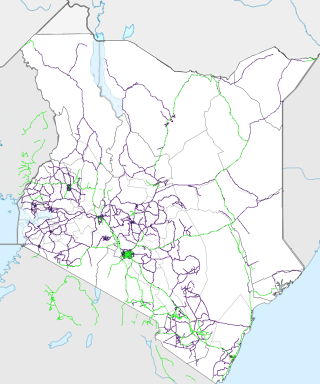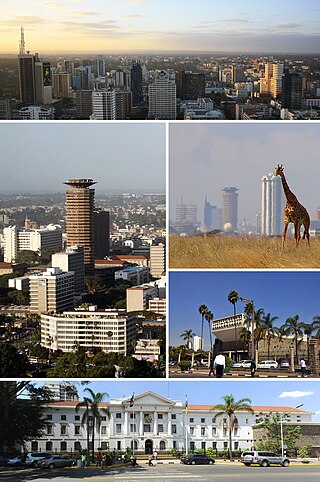Related Research Articles

Transport in Kenya refers to the transportation structure in Kenya. The country has an extensive network of paved and unpaved roads.

Nairobi is the capital and largest city of Kenya. The name is derived from the Maasai phrase Enkare Nairobi, which translates to 'place of cool waters', a reference to the Nairobi River which flows through the city. The city proper had a population of 4,397,073 in the 2019 census. The city is commonly referred to as The Green City in the Sun.

Daniel Toroitich arap Moi was a Kenyan politician who served as the second president of Kenya from 1978 to 2002. He is the country's longest-serving president to date. Moi previously served as the third vice president of Kenya from 1967 to 1978 under President Jomo Kenyatta, becoming the president following the latter's death.

Nakuru County is a county in Kenya. It is county number 32 out of the 47 Kenyan counties. Nakuru County is a host to Kenya's Fourth City – Nakuru City. On 1 December 2021, President Uhuru Kenyatta awarded a City Charter status to Nakuru, ranking it with Nairobi, Mombasa, and Kisumu as the cities in Kenya. With a population of 2,162,202, it is the third most populous county in Kenya after Nairobi County and Kiambu County, in that order. With an area of 7,496.5 km2, it is Kenya's 19th largest county in size. Until 21 August 2010, it formed part of Rift Valley Province.

Kenyatta University (KU) is a public research university with its main campus in Nairobi, Kenya. It acquired the status of university in 1985, being the third university after University of Nairobi (1970) and Moi University (1984). As of October 2014, it was one of 23 public universities in the country.

Kenyan literature describes literature which comes from Kenya. Kenya has a long literary tradition, both oral and written; primarily in English and Swahili, the two official languages of the country.
Lee Maiyani Kinyanjui is a Kenyan politician. He is the second and immediate former governor for Nakuru County.

Jomo Kenyatta University of Agriculture and Technology (JKUAT) is a public university that is situated in Juja, 36 kilometres northeast of Nairobi, along the Nairobi-Thika SuperHighway, off Exit 15. It offers courses in Technology, Engineering, Science, Commerce, Management and Building sciences and holds a strong research interest in the areas of biotechnology and engineering. Notable alumni include Dr. Paul Chepkwony, the first governor of Kericho County in Kenya and a former lecturer, Emma Miloyo, a prominent Kenyan architect and the first female president of the Architectural Association of Kenya, as well as Aden Duale, the former Leader of Majority in the 11th Kenyan Parliament among others. As at 2023, the Vice Chancellor of the University was Prof. Victoria Ngumi.

Joseph Magutt is a Kenyan academic, diplomat and geopolitical consultant. He was appointed by President Uhuru Kenyatta as Ambassador Extraordinary and Plenipotentiary to the Federal Republic of Germany with accreditation in Romania and Bulgaria in August 2014. His diplomatic appointment under the new constitution was for the first time in the history of Kenya subjected to vetting and approval by parliament of the republic of Kenya.
Centum Investment Company Plc, commonly known as Centum is a public East African investment company. It operates as an affiliate of the Kenyan government-owned Industrial and Commercial Development Corporation (ICDC).
Austin Bukenya is a Ugandan poet, playwright, novelist and academic administrator. He is the author of the novel The People's Bachelor, and a play, The Bride. He has taught languages, literature and drama at Makerere University in Uganda and universities in the UK, Tanzania and Kenya since the late 1960s. He has also held residences at universities in Rwanda and Germany. Bukenya is also a literary critic, novelist, poet and dramatist. An accomplished stage and screen actor, he was for several years Director of the Creative and Performing Arts Centre at Kenyatta University, Nairobi.

Kenya – Rwanda relations are the bilateral relations between Kenya and Rwanda. Kenya is a partner of Rwanda in many areas, particularly trade, security (military), education, agriculture and energy.
David Kakuta Mulwa is a Kenyan writer, academic, theatre director and actor. He is currently a theatre arts lecturer in Kenyatta University's School of Visual and Performing Arts.

Njué Kevin is a Kenyan film director, producer and screenwriter. He is best known for writing and directing the film 18 Hours which won the Best Overall Movie in Africa, AMVCA 2018. This category had never seen a Kenyan film be nominated, and so marked history as the first Kenyan film to be nominated and win in the history of the awards.

Paramount Chief Kinyanjui Technical Institute (PCKTTI) is a collegiate public, technical institute in Nairobi Kenya. PC Kinyanjui was founded in 1979 with a total of 1,500 students. The vision of starting the school was established by Jomo Kenyatta, the first president of the republic of Kenya. PC Kinyanjui was then upgraded to a technical collegiate institution in 1987 and offers a variety of courses including Engineering education, Business education, Hospitality, ICT. Mrs. Lucy M. Anampiu is currently the Chief Principal of the Institution. PC Kinyanjui Technical Training Institute is accredited by TVET (Technical and Vocational Education and Training) as a technical training Institution.
Peter Waweru Kamaku is a Kenyan football referee, academic administrator and researcher. He has been a referee in Kenyan Premier League since 2013 and a FIFA listed referee since 2017. He is also a professor of pure mathematics at Jomo Kenyatta University of Agriculture and Technology in Kenya.

Pete Ondeng is a Kenyan leader, author, and public speaker. He started his career as an internal auditor at McDonald's Corporation, where he qualified as a Certified Public Accountant (CPA). Since 1986, Ondeng has advocated for economic governance and development in Africa.
References
- 1 2 "Man Around Nairobi: Kinyanjui Kombani - Potentash". Potentash. 2016-05-25. Retrieved 2017-09-30.
- 1 2 3 "Kinyanjui Kombani | Who's Who SA". whoswho.co.za. Retrieved 2017-09-30.
- 1 2 "About Kinyanjui". www.kinyanjuikombani.com. Retrieved 2017-09-30.
- ↑ Ngunjiri, Mbugua (2013). "Writer tackles 'Villains of Molo'". The Standard. Retrieved 2017-09-30.
- ↑ "Review: Den of Inequities | the Magunga". the Magunga. 2014-05-12. Retrieved 2017-09-30.
- Kinyanjui Kombani. (18 November 2016)."Why I may return my award, says the chagrined writer". The Nation. Retrieved 30 September 2017. Updated 5 July 2020.